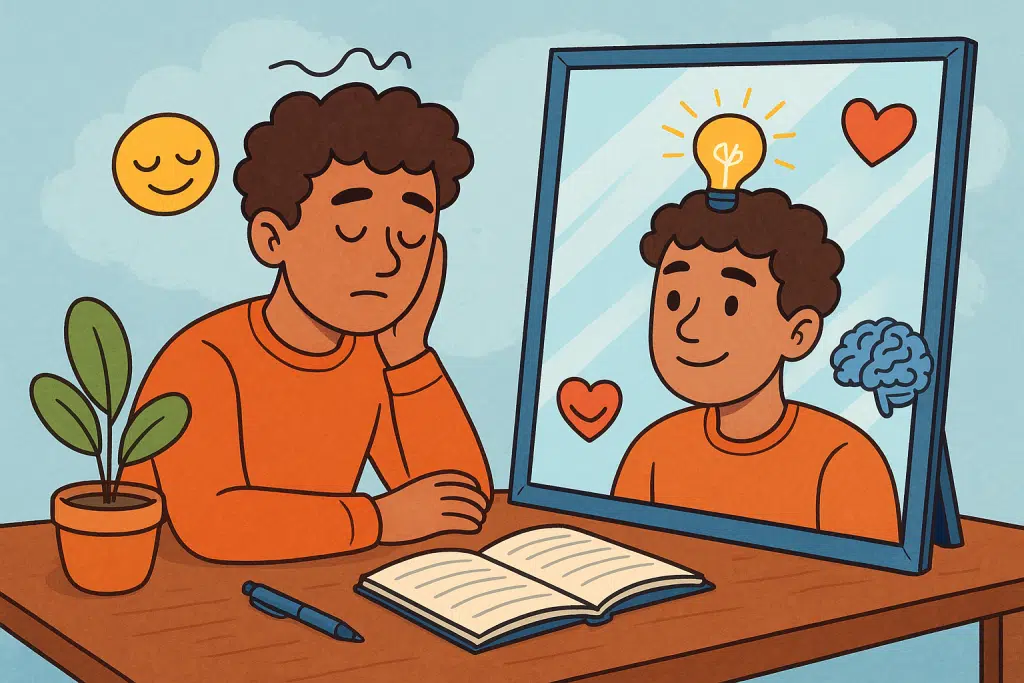How to Use Reflection to Improve Your Mental Health
Charlotte Stone August 7, 2025
Mental health is no longer a hush-hush topic reserved for late-night Google searches. It’s front and center, and for good reason. With burnout on the rise, remote work blurring the lines between personal life and career, and anxiety levels spiking across all age groups, people are finally paying attention to how they feel – and why.

Enter: reflection. Not the mirror kind. The deep, intentional, self-examining kind that can help clear out mental clutter and replace it with clarity, peace, and direction. Reflection is gaining momentum as a must-have wellness tool, especially in the post-pandemic era where mental resilience is more crucial than ever. Whether you’re trying to build a career without burning out or simply want to sleep without the 3 a.m. existential dread, learning how to use reflection to improve your mental health might be the game-changer you didn’t know you needed.
What is Reflection, Really?
Reflection, in the context of mental health, is the process of thoughtfully considering your experiences, behaviors, thoughts, and emotions. It’s about slowing down, stepping back, and observing what’s happening inside you – without judgment.
Sounds simple? In theory, yes. But in practice, most of us are so used to reacting on autopilot that pausing to reflect feels like hitting the emergency brake on a moving train.
Why It Works
Reflection is powerful because it activates your metacognition – your ability to think about your thinking. This awareness is what allows you to:
- Recognize unhealthy thought patterns
- Understand emotional triggers
- See situations more objectively
- Make decisions based on clarity, not chaos
According to a study published in the Journal of Personality and Social Psychology, reflective practices can reduce depressive symptoms and increase life satisfaction when paired with healthy coping strategies.
The Link Between Reflection and Mental Health
Let’s talk neuroscience for a hot second. Reflection engages the prefrontal cortex – the part of your brain responsible for decision-making, emotional regulation, and self-awareness. When you reflect regularly, you’re literally strengthening your mental muscles.
This can lead to:
- Lower levels of anxiety and stress
- Greater emotional resilience
- Improved focus and productivity
- Stronger relationships (because self-aware people don’t project their chaos onto others)
In a world that rewards speed and busyness, reflection is your mental health insurance.
Reflection as a Tool for a Productive Career
Here’s where it gets interesting. Reflection isn’t just for your “feelings journal” or post-breakup phase. It’s also a career accelerator.
A Harvard Business School study found that employees who spent 15 minutes at the end of their workday reflecting on what they learned performed 23% better after 10 days than those who didn’t. Let that sink in: 15 minutes of mental housekeeping = noticeable improvement in performance.
So if you’re trying to build a focused, productive career, reflection can:
- Help you identify what’s working and what’s not
- Clarify your goals and values
- Reduce decision fatigue
- Improve your problem-solving skills
How to Use Reflection to Improve Your Mental Health
Let’s break it down into practical steps. No fluff. Just stuff that works.
1. Schedule a Daily Mental Check-In
Block out 5–10 minutes at the start or end of your day. Ask yourself:
- What am I feeling right now?
- What’s been weighing on my mind?
- Did anything today trigger me?
- What gave me energy?
Write it down if you can. Don’t filter. Just be honest. Over time, you’ll start to notice patterns.
2. Use Reflective Journaling
This isn’t just about writing your day’s events. It’s about digging deeper. Try prompts like:
- What did I learn about myself today?
- What am I avoiding, and why?
- What would my wiser self say to me right now?
Apps like Journey or Day One make it easier if you prefer digital over pen and paper.
3. Take Reflective Breaks Throughout Your Workday
Instead of scrolling social media during breaks, take 5–10 minutes to reflect:
- Did I approach that task in the best way?
- What distracted me?
- How can I refocus?
These micro-reflections can reset your mindset and boost your productivity.
4. Practice Guided Reflection
Use audio guides or reflection prompts from platforms like Insight Timer or Calm. These offer structure if you struggle with open-ended self-examination.
You can also try the tried-and-true method of asking: “What happened? How did I feel? What can I learn?”
5. Reflect with a Therapist or Coach
Sometimes we need a mirror that talks back. A mental health professional or coach can help you explore deeper thoughts and guide you toward insight.
Reflection doesn’t mean going solo. It means being willing to explore, and sometimes that means doing it with a guide.
Common Challenges (And How to Beat Them)
“I don’t have time to reflect.”
Let’s be real: if you have time to scroll Instagram for 20 minutes, you have time to reflect for 10.
Start small:
- 2 minutes in the shower
- 3 minutes before you start your car
- 5 minutes while drinking your morning tea
Consistency matters more than duration.
“I don’t know how to start.”
Use prompts. Set a timer. Don’t overthink it.
Start with:
- What made me feel good today?
- What made me feel off?
That’s enough to kick things off.
“I don’t want to feel worse.”
Reflection isn’t about wallowing. It’s about witnessing. If painful feelings come up, that’s not failure – it’s healing starting.
Pair reflection with grounding techniques (deep breathing, movement, prayer) to stay regulated.
The Role of Your Environment: Why Home Matters
Your physical environment affects your internal world more than you realize. If your home is chaotic, your mind will be too.
Create a Reflective Space at Home:
- Designate a corner or chair for journaling or thinking
- Keep it clean and clutter-free
- Add soothing elements like a candle, plant, or soft lighting
This conditions your brain to associate that space with calm, focused thinking.
Building a Sustainable Reflection Habit
Start with These Weekly Reflection Questions:
Every Sunday (or your chosen day), take 15–20 minutes to ask:
- What drained me last week?
- What recharged me?
- What do I want to carry into this week?
- What do I want to leave behind?
Write it down. Don’t aim for perfection – aim for honesty.
Stack It with Existing Habits
Link your reflection time with something you already do:
- After brushing your teeth at night
- Right before checking emails in the morning
- During your commute (voice note style)
Track Your Mood
Use a simple mood tracker app like Moodnotes or Reflectly to log how you’re feeling over time. This helps you connect your mental state to your habits and choices.
Reflection Trends in 2025: What’s New?
As of 2025, reflection is trending beyond the self-help aisle. It’s becoming:
- Corporate: More companies are offering mindfulness and reflection sessions to reduce burnout and improve team productivity. LinkedIn Learning now offers a full course on workplace reflection.
- Digital: Reflective journaling apps are integrating AI to offer feedback on entries (e.g., Replika, Mindsera).
- Social: Group reflection circles, once reserved for yoga retreats, are now a thing on Zoom. People are craving connection and vulnerability in safe spaces.
Reflection isn’t just personal anymore – it’s cultural.
Final Thoughts: Reflection Isn’t a Luxury, It’s a Necessity
If you’re feeling overwhelmed, anxious, distracted, or just generally blah – reflection is your reset button. It gives your mind the pause it desperately needs to process, learn, and heal.
And the beauty is: it doesn’t require a therapist’s couch or a trip to the Himalayas. Just a quiet moment, a curious heart, and a willingness to see what’s really going on beneath the surface.
Because the truth is, growth doesn’t always come from doing more. Sometimes it comes from thinking better.
References
- Lyubomirsky, S. (2019). How Self-Reflection Can Improve Your Mental Health. Psychology Today.
https://www.psychologytoday.com/ - Greater Good Science Center. (2021). How Journaling Helps Improve Your Mental Well-Being. University of California, Berkeley. https://greatergood.berkeley.edu/
- Cherry, K. (2022). The Power of Reflection in Mental Health and Personal Growth. Verywell Mind. https://www.verywellmind.com/







